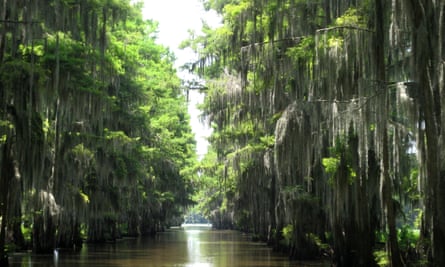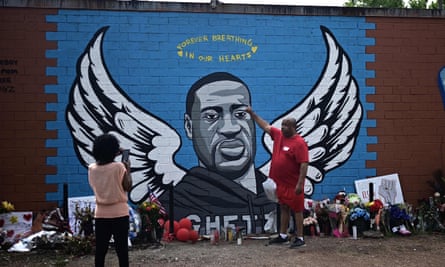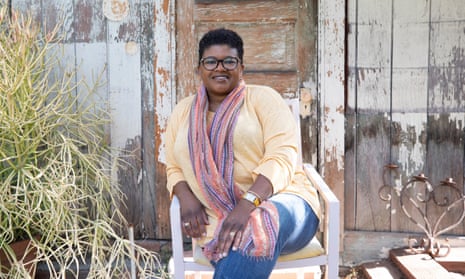I come from a long line of black Texans, going back generations, all the way to slavery. The Great Migration was the largest migration of people within their own country – certainly in US history. Throughout the 20th century, most certainly after the first and second world wars, southern blacks left for the north by the tens of thousands, leaving behind Jim Crow, the constant threat of violence, limited economic opportunities and the disrespect that, after having served overseas and been treated differently in Europe (by margins, of course), they could no longer tolerate. So they moved north and west, to cities such as Chicago and Philadelphia, New York, and Newark, New Jersey and eventually west to California. But my family stayed in the south. We stayed in Texas, save for a few cousins here or there who had mouthed off to the wrong white man and needed to get on a train out of town – quick. We stayed because we had land. And that land meant economic power.
How did we get this land? A combination of homesteading and purchasing land piecemeal. During and after the US civil war, there were several homesteading laws passed – by which you could claim land as long as you made some improvement on the property, built an edifice or started a farm – and several of these laws in the south had the intention of righting economic and societal wrongs on the other side of slavery. It was conceived as a way to give ex-slaves a way out of poverty; a way to become self-sustaining citizens. Again, land as a political tool. On my mother’s side, my ancestors used these laws to obtain land, forming the Freedmen’s community of Nigton, Texas, with some Native Americans as well. Nigton is exactly as it sounds: short for Nigger Town, which is what white folks called it. It was home for my people and, from Nigton, we launched generations of doctors, lawyers, educators and politicians. Land offered the possibility of economic ascent. And like my mother’s family, my dad’s side also hail from small towns along Highway 59 in east Texas. Some white relative of my great-grandfather quietly helped along my family’s acquisition of land (the details of which my sister, Tembi Locke, is currently researching for a book). My great-grandfather couldn’t afford enough land for one large farm, so he had small plots through San Jacinto county, Texas, where he grew cotton and corn.
When I was in my late 30s, I started contemplating the twisted and racist history of Texas and wondered why our family never left. I asked both my great Aunt Altha and my grandmother, Willie Jean, whom we call Precious. They both told me, “Well, Daddy had a farm.” As I write in my novel Bluebird, Bluebird, telling the family history of my black Texas Ranger Darren Mathews:
“… black folks didn’t just up and leave that kind of wealth to start over somewhere foreign and cold. No, the Mathewses dug deeper into the soil, planting cotton and corn and the roots of a family that would be theirs alone – and not a pecuniary unit, convertible to cash at will. They farmed hard and made enough to raise generations of men and women and send dozens of them to college and graduate school; they made a life that could rival what was possible in Chicago or Detroit or Gary, Indiana. They were not willing to cede an entire state to the hatred of a bunch of nut-scratching, tobacco-spitting crackers. Money allowed for that choice, sure it did. But money also demanded something of them, and the Mathewses were willing to give it. They built a colored school in Camila, offered small business loans to colored folks when they could, and dedicated their lives to public service, becoming teachers and country doctors and lawyers and agitators when the times called for it. What they were not going to be was run off.”
This passage is basically my family’s story. This is why we never left.
Because of the ingenuity and hard work of my ancestors, I came into the world with relative privilege. I come from landowning, educated people going all the way back to Reconstruction. And with the privilege of being born to this particular station in life – landowning black Texans – I have also understood what our land, the fact of it, has meant to white racists around us. People have been trying to steal our land since we got it, helped along by later generations of black folks moving to big cities like Dallas and Houston, leaving white folks the freedom to steal rural land that black folks had left sitting empty. Us being away, trying to build a different kind of wealth than the kind made off the land meant we couldn’t always keep an eye on what was going on in the land from which we came. And folks forged signatures, falsified documents – moving property lines in their favour – all while local officials turned a blind eye. I have grown up with these stories. I have watched my mother go toe-to-toe with white men in these rural courthouses who say they can’t help her. They have my dead grandmother’s signature on a piece of paper that says she gave them this or that. One actually “bought up” a strip of land that led to our property, so that my mother would be trespassing to get to our land, then demanded my mother buy it back to freely access what was hers. All of these negotiations were done with pickup trucks and gun racks nearby. This is Texas, after all.
Land is power. Colonisation began with the amassing of land in foreign nations through theft; my own country began with rolling decades of theft of land from Native Americans, for whom land was considered god-given. Wars have been fought throughout the world over land. And in my novels, it occurs to me how often the tangible, bloody crimes at the centre of these stories are almost always masking larger crimes about land use, land ownership, and the power bestowed by each.
I say all this to say: land ownership and the fight over it had been lying dormant in my psyche for years before I ever wrote my first book.
****

Let’s talk about that first book. I had no idea what I was doing when I wrote Black Water Rising, nor did I have an appreciation for how deeply the unconscious mind plays a role in the writing of a book. The opening scene – a woman screaming for help on a boat, then gunshots – was based on a real incident that happened to my family. I thought I could take that, insert a struggling criminal defence attorney with a difficult past as an activist, and write a slick thriller. The book I ended up with is better than the one I intended to write. Though the murder that opens the story seems isolated, over the course of the novel we come to learn that another storyline – a longshoremen strike and the threat of oil and gas workers walking out in solidarity with the dockworkers – is connected.
Jay Porter, the defence attorney, figures this out by investigating a fraudulent real estate deal. For land plays a huge part in painting the setting of Houston, Texas. The book is set in 1981, a time of exponential growth in the city, during the oil-boom years. And it is a city that can’t keep up with its growth and serve all of its citizens. Jay lives in a predominantly black neighbourhood that only has sporadic trash pickup because the city can’t/won’t service the area, while the wealthier neighbourhoods hire private contractors to haul away their trash. That the city can’t/won’t provide services in black neighbourhoods is the reason the murder that opens the novel occurs in a place like Fifth Ward, where a couple of gunshots might go unreported to law enforcement. And in this way, you get a picture of the ways in which political and societal neglect, most often seen in black and brown neighbourhoods, breed criminality – the politics playing a part in the narrative.
But back to the fraudulent land deal on which the whole plot turns. (And this is a spoiler.) When Jay finds out the woman he saved from the bayou at the beginning of the novel works for Stardale, a real-estate agency that’s nothing but an empty building, he goes to visit a man who’d been approached by Stardale, offering a lot of money to buy up homes in the area … and quickly. Because the land, in the form of crude oil coming up in people’s backyards, is revealing the biggest crime in the book: an oil company has been illegally storing and hiding oil in land in order to manipulate the price, and has been buying land from vulnerable people to cover its crime. Land represents power.
****
My second novel, The Cutting Season, begins with the discovery of the body of a young woman, left on the wrong side of a property line. She is a migrant worker, hired by a big agriculture firm to work in the sugarcane fields that abut the Belle Vie plantation. The plantation is based on a real place in Louisiana, which I went to for a wedding. It was one of the oddest experiences of my life. I burst into tears the second I stepped foot on that land and what it represented, me standing there in a fancy dress and high heels near a plaque with the names and costs of all the slaves that had been owned there. The bride and groom were an interracial couple. My husband and I are an interracial couple. I waited all night for someone to speak about where we were. How we had gathered on land that represented so much racial violence and pain, how we might remake the land with the power of love. But as the night went on, I realised that the couple had chosen the location simply for its beauty. And it was stunning. But that’s part of its cunning, part of the ways in which it obfuscates history. As I wrote in the novel,
“ … Belle Vie, its beauty, was not to be trusted. That beneath its loamy topsoil, the manicured gardens, two centuries of breathtaking wealth and spectacle, lay a land both black and bitter, soft to the touch, but pressing in its power.”
The Cutting Season is very much about the fact that who owns the land of our shared history gets to shape how – and even if – that history gets told. Caren Gray, a descendant of the slaves who worked on Belle Vie and now the general property manager, is initially caught up in the mystery of the murdered migrant worker. But while trying to solve that crime, she learns that the plantation is going to be sold to the large agriculture business for whom the woman worked, who will level the plantation to plant more sugarcane, thereby further erasing the history of the land, which Caren ultimately discovers was stolen from one of her ancestors, a freed slave, after the civil war. It’s a Russian doll of obliterating history.
****

I learned about the very real neighbourhood of Pleasantville when my father ran for mayor of Houston in 2009. I could not understand how this middle-class area had become the district courted by every candidate for mayor, congressperson and governor. In 1949, two Jewish developers came up with the idea of a planned residential community for black folks with money, and Pleasantville was born. What those developers likely hadn’t considered is what it would mean to gather thousands of black folks with money and education in one place. They created a powerful new voting precinct that changed Texas politics; as the epigraph to my third novel, Pleasantville, says: “Every politician worth his salt knows the road to elected office passes through Pleasantville.”
The Pleasantville we meet in the book, which is set in 1996, is up against the ropes. As is true of the real Pleasantville, because for all their political power, the residents couldn’t keep chemical plants from being built on what had once been surrounding prairie land – and in some cases didn’t want to, because of the promise of jobs. A year before the book takes place, there had been a chemical fire at one of these plants that burned down part of the neighbourhood.
My attorney Jay Porter is back in this novel, representing the residents of Pleasantville in a class-action lawsuit against a chemical company responsible for a fire that tore through part of the neighbourhood. He gets dragged into the goings-on of an election when a Pleasantville native runs for mayor, while a girl working for the opposing campaign goes missing in the area. On its face, it seems a simple story of a missing girl – but Jay discovers someone is using the mayor’s race to destabilise certain voting districts, by targeting individuals using their data and trying to sway their vote. Jay realises that the 1996 mayor’s race in Houston is a test run for something the Republicans will try in the 2000 presidential race. (And we all know what happened there.) As Jay’s fellow attorney Charlie Luckman puts it, “The way elections are run, it’s all changing. It’s not precinct by precinct anymore, not for the ones who want to win. Four years from now it’s all going to come down to a handful of votes.”
The ways in which real estate can be used to manipulate and dilute black voting power is the real crime of the novel. And it’s something that my country is still dealing with. Efforts to erode black voting rights. Redrawing district lines on campaign maps. Putting fewer polling places in black neighbourhoods. This is a story of real estate as political destiny.
****
Bluebird, Bluebird brings me back to my Texas roots. In my fourth novel, two back-to-back murders take place in the town of Lark, once a plantation owned by the ancestors of one Wallace Jefferson. Generations later, a parcel of land was gifted to Geneva Sweet, who opened a cafe there. Geneva’s was initially for black travellers on Highway 59, who had nowhere else they could stop and eat during segregation. As I write in the book:
“The place had been born of an idea that colored folks who couldn’t stop anywhere else in this county, well, they could stop here. Get a good meal, a little bite off a bottle of whiskey, if you could keep quiet about it; get your hair cleaned up before you made it to family up north or to the job you hoped would still be there by the time you got on the other side of Arkansas, ’cause it was no point in going if you didn’t get way the hell past Arkansas.”
Geneva’s was based on a cafe my great-grandmother had in Corrigan, Texas, off Highway 59, which was also a place where black folks could stop and be served. Lark, the town, exists because of the crime of slavery. And the roots of the history still run deep in the town in 2016, when the book takes place, as the town remains quite segregated. At least on the surface. Darren Mathews, the black Texas Ranger who comes to town to investigate the two murders, ends up discovering that the people of Lark are more entangled emotionally and genetically than is ever discussed openly.
And the first murder, which inadvertently led to the second, has at the core of its motive: land. Jefferson wants the land that Geneva’s cafe sits on. It was given to Sweet by his father, with whom she was once romantically involved, and Jefferson believes it is his birthright. But reclaiming and possessing the land is really a way to claim and possess Geneva – a way to return to a time when his family owned all the land in Lark and its people.
****

The plot of my fifth novel, Heaven, My Home turns on land ownership, bringing us back to the issue of how this country was founded on a crime – stealing land from Native Americans. The book takes place around Caddo Lake and the fictitious Hopetown, which is inspired by Nigton. It is a freedmen’s community on its last legs, and down to its last few residents: a black man and a family of Caddo Indians. Texas was actually named by the Caddo Native Americans; their word for friend, tayshas, became Tejas, then Texas. If anyone can lay claim to the state, the Caddos and other native tribes can. But Texas’s history is rife with wars and battles over whose land it was. Mexico, Spain and France, and ultimately the white Americans – European descendants – lay claim to it at one time or another. But the state’s soul belongs to Native Americans. In one scene, Darren observes of Caddo Lake:
“It was raw beauty, floating through a forest of trees older than time itself, trees that seemed to stand sentinel against outsiders, against any man or woman who didn’t respect the lake’s history, who didn’t respect or understand what had been here before any of them on that boat had been born, before America was even an idea, before Mexico and Spain had a piece of it, before the French tried it too, before Texas was more than a word of kindness on a Caddo’s lips. Tayshas.
In the novel, the story of a missing boy is masking a deeper fight over land – the land on which Hopetown sits. The missing boy is part of a family of white supremacists who are squatting on land in Hopetown, which has left the Native Texans feeling under attack. Of course, the white supremacists squatting on the land is a metaphor for colonialists coming in and squatting on Native American land. All of these moral and real crimes are roiling beneath the story before it even starts. Darren Matthews is sent in to investigate – but he’s also instructed to use the case to dig up dirt on the boy’s father, the captain of the Aryan Brotherhood of Texas. Because it’s my latest book I feel protective about spoilers – so, let me just say that the boy’s fate hangs on a real estate deal that would rob some people of their political power for pure greed.

It wasn’t until now, as I write this, that I realise the degree to which these issues have been part of my family history, and that’s why I return again and again to issues of who owns what and how they got it. My books often start with a small crime that is masking a much larger, more dangerous one in terms of politics and money. This, in my opinion, is how we ought to consider a great deal of crime. George Floyd loses his life over allegedly passing a counterfeit bill. Eric Garner for “illegally” selling cigarettes. And all the while, there are any number of larger moral crimes that set either one of them on a petty crime path. That never should have cost them their lives. Almost certainly, some of those moral or literal crimes turn on land use and property – whether it is using property taxes to fund schools, so that poor neighbourhoods have schools with fewer resources, or how police funding gets apportioned by neighbourhood and the history of redlining and banks not offering business or home loans in African American areas, thus suppressing economic growth. We are often quick to bring down the hammer on street crimes – men and women trying to survive – while larger corporate and political criminals get away with murder, figuratively and literally. At the heart of it, this is why I write the books I write: I am looking for the crime behind the crime.
This is an extract of a lecture commissioned by the National Centre for Writing and the University of East Anglia for the 2020 Noirwich crime writing festival. You can watch the full lecture and a Q&A with Attica Locke here.
